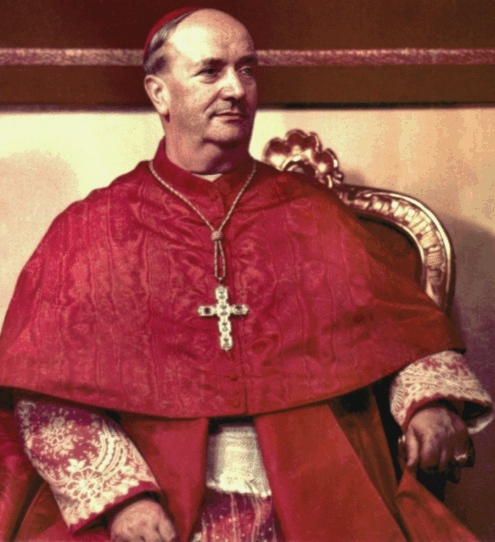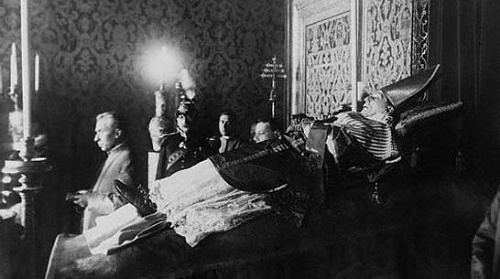In the same year in which Father Montini began his friendship with his physician, Roberto Zorza, he attended a series of lectures on Canon Law at the Lateran Palace being given by Alfredo Ottaviani, who was then a young priest like Montini, but several years older, and widely considered one of the most promising clerics of the new generation. He was a prodigy in jurisprudence, philosophy, and ecclesiology.
In many respects, one finds Ottaviani (the scrappy son of a humble baker from Trastevere, one of thirteen children, blind in one eye, and who rose to prominence entirely on the merits of his own uncompromising intellect) preferable to Montini (as there can be little doubt that the influence of Montini’s father—the editor of a Catholic newspaper and a member of the haute bourgeoisie as well as the Italian Parliament—had something to do with the ease of his son’s journey up the steps of the ecclesiastical ladder). Ottaviani had a talent for ruthless clarity and precision, whereas Montini could be deliberate almost to a fault; his ability to appreciate both sides of an argument sometimes led him to taking wishy-washy and noncommittal stances when a firmer hand was demanded. Also, Ottaviani was said to have had a caustic wit and a certain waspish charm, while Montini appears to have been somewhat bland (the curse of the moderate). Ottaviani was overall better-suited to his time and environment. The Catholic Church in the twentieth century needed principled and doctrinaire leaders, not milquetoast compromisers. With his smarts and gravitas, Cardinal Ottaviani was considered a front-runner among the papabile in 1958, but the conclave chose the unserious Angelo Roncalli instead, and so the Church got John XXIII, the bringer of jollity. Such is life. As St. Vincent of Lerins famously put it: “God gives some Popes, God tolerates some Popes, and God inflicts some Popes.” And in 1963, it would be Cardinal Ottaviani who placed the tiara on the head of Pope Paul VI at his coronation, and not the other way around. (It should be remembered, however, as was summarized in this post, that Paul VI was not culpable for the ruin and wreckage caused during his papacy. As can be inferred from his attendance at Ottaviani’s lectures, he was at the very least not a liberal).
He was being actively recruited, in 1921, for a position in the Vatican Secretariat of State by the foreign ministry sostituto, Monsignor Giuseppe Pizzardo. This recruitment itself hints at Father Montini’s religiously conservative bona fides, for Pizzardo was a staunch anti-modernist, and the Secretariat was known for attracting the more traditional-mined young curialists of the time, including the aforementioned Ottaviani, as well as Fr. Antonio Bacci, who would be his co-signatory in the Ottaviani intervention in 1969. But that is to get ahead of things.

Alfredo Cardinal Ottaviani (1890 – 1979). His motto was “Semper Idem”—“Always the Same.”
The following year dawned drearily. January of 1922 was a frigid and wet one. Montini caught the flu. The pope did as well. Benedict XV took ill from standing too long in the winter rain outside of Saint Martha’s Hospice in the Vatican, where he had celebrated Mass for the nuns there. He had been waiting on the papal limousine; unfortunately, his driver ran late. On the seventeenth of January, the pope’s flu had progressed to pneumonia, and he lay down in his bed for the very last time. He departed this life five days afterwards. He was sixty-seven years old. While the body was lying in repose at St. Peter’s, Father Montini went with his doctor, Roberto Zorza, to offer his prayers for the deceased. It was a truly funereal day: a louring gray sky, a persistent rain, and a square crowded with public mourners, all dressed in black, holding black umbrellas.

The death of a pope: the body of Benedict XV, 1922.
A fortnight later there was a new pope: Achille Ratti, the Archbishop of Milan, who took the name Pius XI. On the sixth of March, Pius granted a private audience to the students of the Pontifical Academy. Earlier in this post it was mentioned that Montini enjoyed the benefit of influence: and indeed, on this occasion Pope Pius singled him out for a brief conversation—enquiring after his father, and expressing his admiration for Montini’s mentor in Brescia, Fr. Bevilacqua (at the time, Bevilacqua was well-regarded as a pastoral liturgist). Father Montini’s path to the nunciature continued on. In July of that year he toured Austria and Germany as a prospective ambassador, to acquaint himself with the customs, culture, and language. He discovered he was not a Germanophile, writing in a letter to Roberto Zorza that the culture and the art of the region were “oppressive and incomprehensible.” The existential gloom of Grünewald crucifixes and Doctor Faustus did not settle well with him; in Tübingen he sat through a philosophy lecture full of the weighty Teutonic concern with aesthetics and perfection; and his attendance at a showing of F.W. Murnau’s expressionist vampire film Nosferatu he deemed “a queasy waste of my time.” He was confounded by Gothic sensibilities. (His superiors had diagnosed him correctly: he was a natural bureaucrat, not a writer). He did report to Zorza, however, that sauerkraut was improving his gastrointestinal troubles; he had been advised to seek out fermented foods for their benefits to gut bacteria. He went to Vienna, Berlin, Munich, Oberammergau, Mainz, and Bonn. He stayed for only four months, as the Weimar Republic was at this time experiencing its exponential hyperinflation. In October of ’22 he was informed by Msgr. Pizzardo that his entry into the Secretariat of State was all but certain; it would be best if he finished his scholarship in Canon Law as soon as possible. He returned to his parents’ home in Brescia, and from there he commuted to the Milan Seminary to study in an abbreviated program. His administrators at the Pontifical College in Rome waived some of his requirements. He was awarded his doctorate in December of that same year.